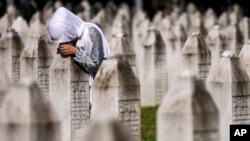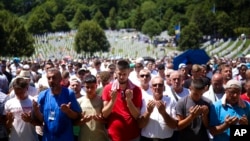Thousands of people gathered in Srebrenica on Thursday to commemorate the first International Day of Reflection and Commemoration of the 1995 Genocide in Srebrenica in which over 8,000 Bosnian Muslims were killed.
The United Nations General Assembly voted in May to make July 11 the annual commemoration of the genocide that occurred 29 years ago.
But Serbia and Bosnian Serbs oppose the adoption of the annual commemoration, saying it portrays all Serbs as “genocidal people.”
Serb officials deny that the 1995 massacre was a “genocide,” instead referring to it as a “terrible crime,” fueling ethnic tensions within the war-ravaged state. The government has attempted to minimize the number of those killed.
Bosnian Serbs took over a safe area protected by the United Nations on July 11, 1995, and killed boys and men after separating them from women and girls in Srebrenica. They then built mass graves, where the bodies were left. They later dug up the graves, scattering additional remains across other burial sites.
The mass killings are the first European genocide recognized since the Holocaust.
The remains of 14 additional victims, including a teenage boy, were buried Thursday at a memorial cemetery outside Srebrenica in eastern Bosnia.
In 2016, Bosnian Serb wartime leader Radovan Karadzic and his commander, Ratko Mladic were sentenced by a U.N. tribunal to life in prison for genocide and war crimes.
The nation has been ethnically divided since Bosnia’s 1992-1995 war between Croats, Muslims and Serbs, taking around 100,000 lives. Denials of a genocide deepen that divide.
The State Department issued a statement marking the anniversary of the genocide.
“The American people join the people of Bosnia and Herzegovina in honoring and mourning the more than 8,000 men and boys who were murdered in July 1995. We stand with the victims, survivors, and families who continue to pursue justice for their loved ones,” the statement said.
Some information for this story was provided by The Associated Press and Agence France-Presse.











